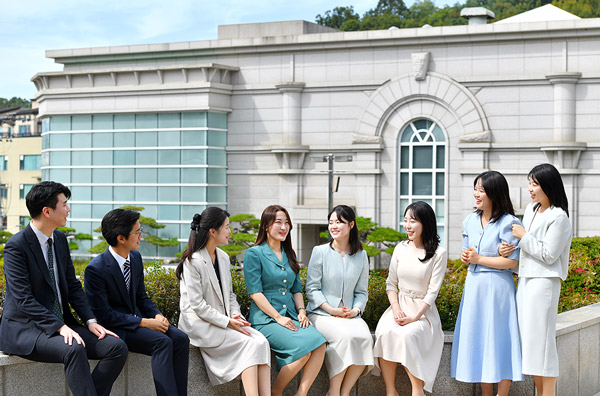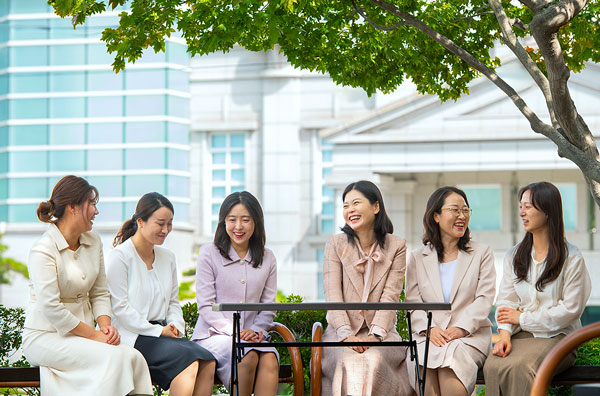Select a Language
Sacred Assemblies 2025: Festival of Trumpets, Day of Atonement, and Festival of Tabernacles
The Message of Salvation for Humanity: “Come to the Spirit and the Bride Who Give the Water of Life”
Among the seven festivals in three times established by God, the third set—the Festival of Trumpets, the Day of Atonement, and the Festival of Tabernacles—was observed consecutively from September 22 to October 13. As God’s people welcomed these sacred festivals that promise the grace of atonement and the blessings of the Holy Spirit, the Church of God members around the world devoted themselves to earnest prayer, repenting sincerely and striving to bear gospel fruit in keeping with repentance.
Festival of Trumpets: Understanding the Will of God Who Desires Humanity’s Salvation
During the Israelites’ journey in the wilderness, Moses ascended Mount Sinai to receive the Ten Commandments. When nearly forty days passed and he did not return, the people assumed he had died and made a golden calf to worship. Because of this grave sin, the tablets of the Ten Commandments written by God’s own hand were broken, and about three thousand people lost their lives. Later, when the people repented sincerely and removed their ornaments in humility, God once again granted the Ten Commandments. The day Moses descended with the second set of tablets—the tenth day of the seventh month—was established as the Day of Atonement.
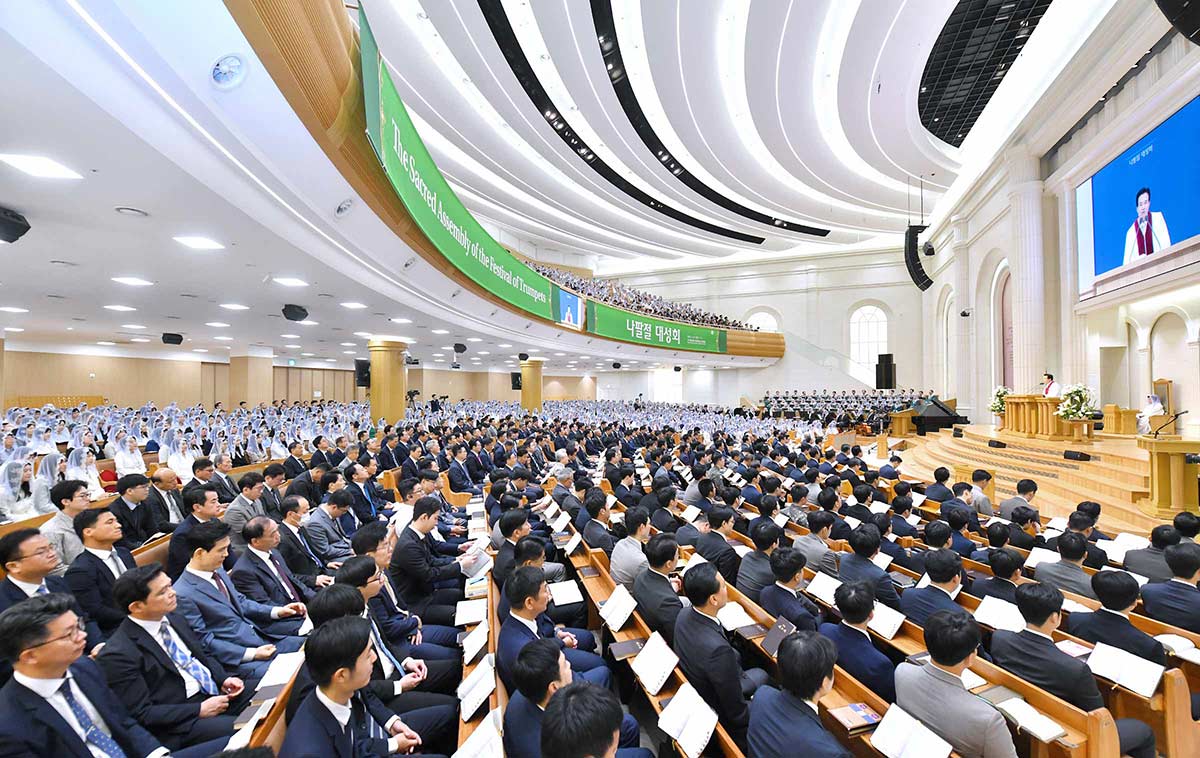
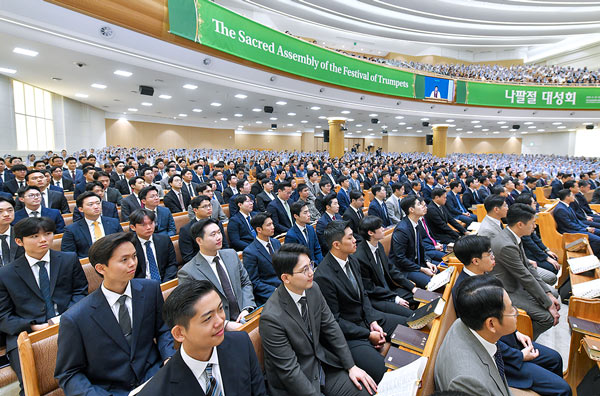
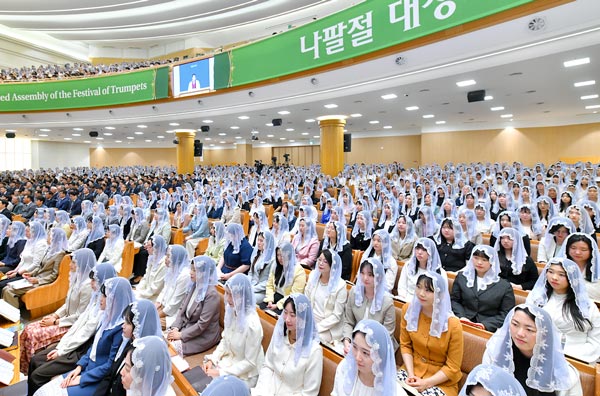
The Festival of Trumpets originated from the blowing of trumpets ten days before the Day of Atonement, calling people to repentance. On September 22 (the first day of the seventh month in the sacred year), during the Sacred Assembly for the Festival of Trumpets, Mother prayed that through the festival, God’s children would be renewed through repentance, dwell in God’s will, love one another, and faithfully carry out the mission of saving souls with love.
General Pastor Kim Joo-cheol emphasized, “To save us who had become distant from heaven because of sin, God came to this earth, restored the festivals of the new covenant, and established Zion where the forgiveness of sins is promised. Understanding this noble will, those who have truly repented must not only turn away from sin themselves but also blow the gospel trumpet powerfully to lead others to repentance” (Jnh 1–3; Eze 18:30–32; Ps 102:12–16; 87:5; Isa 33:20–24; Ps 133:1–3; Mic 4:1–2).
Following the Festival of Trumpets, a ten-day prayer period was observed until the Day of Atonement. During this time, members humbly confessed their past sins before God and prepared themselves reverently for the Day of Atonement.
Day of Atonement: The Essence of Repentance Is Returning to God
On October 1 (the tenth day of the seventh month in the sacred year), the Sacred Assembly for the Day of Atonement was held. Mother prayed that the sincere petitions offered day and night by God’s children would reach Father, and that the blessing of the forgiveness of sins would be granted to them. She also prayed that everyone would deeply realize this grace and devote themselves to leading all people to repentance. Comforting the members who had earnestly repented throughout the ten-day prayer period, She encouraged them, saying, “Let us never forget that without the festivals, which Father established, there would be no way for us to receive the forgiveness of sins. Let us fill our hearts—cleansed through repentance—with the Holy Spirit and live a life that repays God’s grace.”
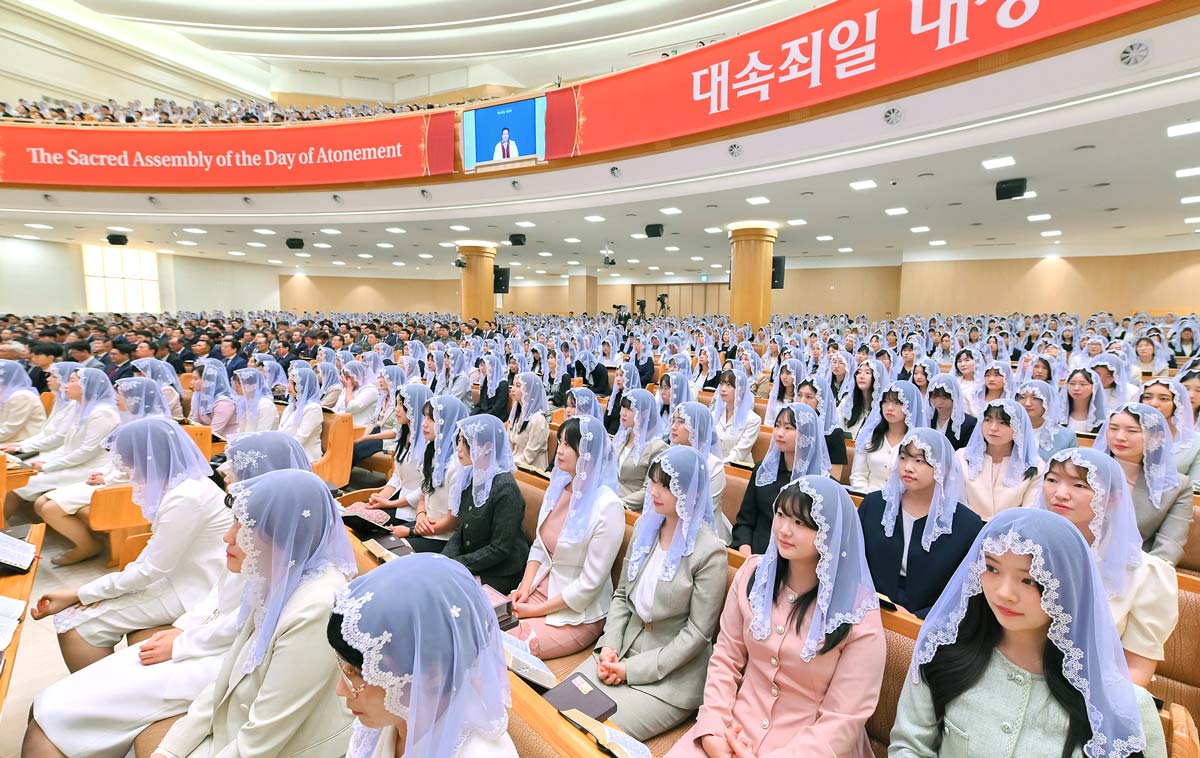
General Pastor Kim Joo-cheol then explained the principle of forgiveness on the Day of Atonement. In the Old Testament, the sins that people committed throughout the year were transferred to the sanctuary through the blood of sacrificial animals such as lambs and goats, which symbolized God. On the Day of Atonement, these sins—temporarily borne by the sanctuary—were placed upon the scapegoat through the laying on of hands. The goat was then sent into the wilderness to die, symbolizing the complete removal of sin. This foreshadowed how the sins of humankind are handed over to Satan the devil, represented by the scapegoat, and ultimately destroyed (Lev 16:5–22; Isa 53:1–12; Rev 20:10, 13–14; Heb 10:1–4).
Pastor Kim emphasized, “Our sins never disappear on their own. We must remember that our sins caused God pain and became the reason for the sacrifice on the cross. Therefore, we should resolve not to commit even the smallest sin.” He further reminded the members that “The essence of repentance is returning our hearts fully to God, from whom we became distant because of sin.” Finally, he urged, “Let us preach the gospel to every neighborhood, city, and nation, so that all humanity may return to the Spirit and the Bride, the Saviors of this age” (Heb 10:26–27; Lk 15:13–24; 2 Ch 30:6–9; Dt 30:8–10; 2 Pe 3:8–9; Rev 22:17).
Festival of Tabernacles: Completing the Gospel of Kingdom With Faith and Obedience by Receiving the Holy Spirit
The Festival of Tabernacles, the final festival in the third set of God’s appointed festivals, is held five days after the Day of Atonement. It originated when, after Moses received the second tablets of the Ten Commandments, the Israelites gathered materials for seven days to build the tabernacle according to God’s command. During the Old Testament times, the people wove branches to make booths and joyfully dwelt in them for seven days. In the New Testament era, this period is observed as a preaching festival.
On October 6 (the fifteenth day of the seventh month in the sacred year), members participated in the Sacred Assembly of the Festival of Tabernacles, praying for blessings for themselves, their families, and all people. Mother prayed that the Holy Spirit would be abundantly poured into the hearts cleansed through the Day of Atonement, and encouraged, “Let us, empowered by the Holy Spirit, proclaim the message of salvation loudly to all souls who are waiting, and plant the hope of heaven in the hearts of all eight billion people in the world.” She also earnestly prayed that many would open their eyes, ears, and hearts to understand the words of life through the work of the Holy Spirit.
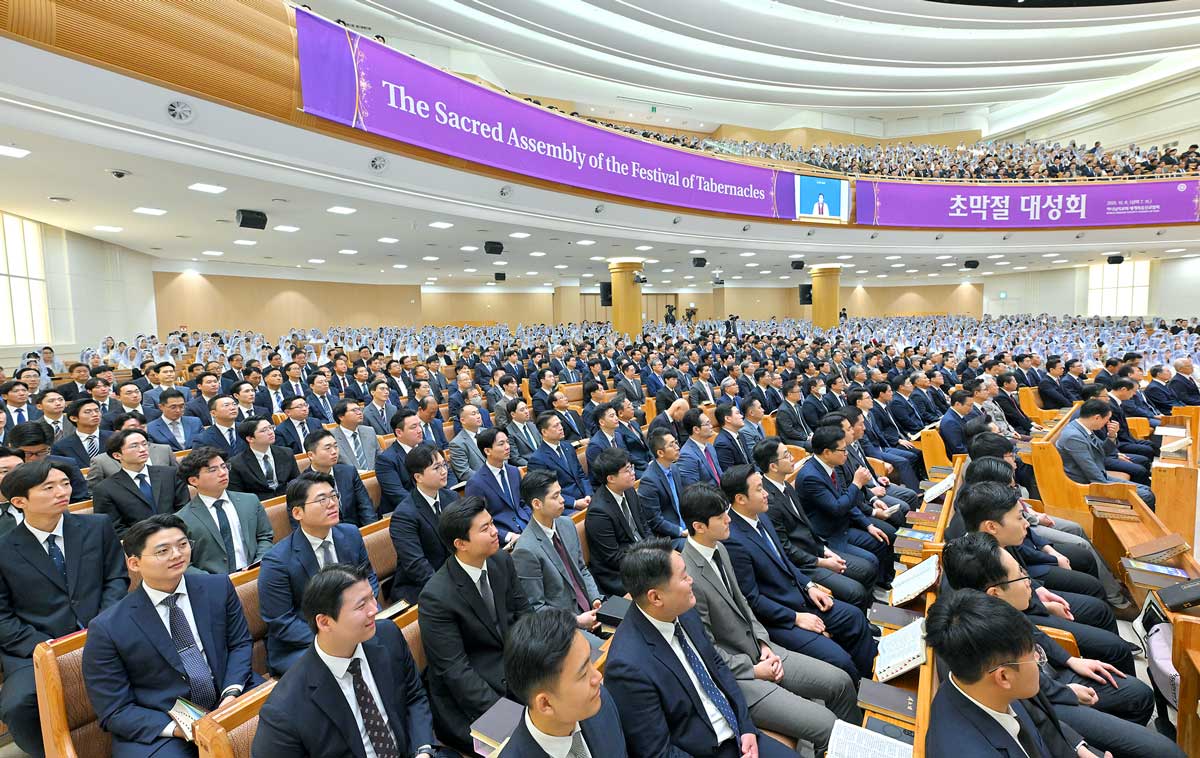
General Pastor Kim Joo-cheol explained, “Two thousand years ago, Jesus Himself set an example by keeping the Festival of Tabernacles and promised the Holy Spirit to those who believe in Him. The Festival of Tabernacles is the time for gathering the materials for the spiritual temple through preaching, and it is an important festival for receiving the latter rain of the Holy Spirit. Let us reflect deeply on the meaning of this preaching festival and pray that the Holy Spirit will be poured out abundantly upon Zion throughout the world” (Jn 7:2, 14–17, 37–39; Isa 61:3; 5:7; Jer 5:14; Eph 2:19–22; Rev 3:12; Zec 14:16–19; 1 Th 2:3–4; 2 Ti 4:1–5).
After a fruitful seven-day preaching period, members attended the worship service for the Last and Greatest Day of the Festival on October 13 (the twenty-second day of the seventh month in the sacred year) with thankful hearts. Mother prayed that the earnest prayers of the children seeking the Holy Spirit would be answered and that they would bear abundant fruits of the gospel as they preach with the same compassion and love as God.
Reminding everyone that the blessings and gifts of the Holy Spirit are privileges granted to those who receive the Savior in each age, General Pastor Kim Joo-cheol encouraged, “With faith that obeys God’s word, let us follow Father and Mother to the end. Let us receive the Holy Spirit by accepting the Saviors of this age, and preach the water of life to all humanity with a sense of mission.” (Hos 6:3; 1 Co 12:3; Rev 7:16–17; Eze 47:1–12; Rev 22:1–5; Mt 7:24–25; Jn 8:47; Nu 32:11–12; Dt 28:1–19; Heb 3:18–4:13).
After the worship, Mother encouraged the members who had faithfully kept the festivals for about three weeks, saying, “With the power of the Holy Spirit that Father has granted, may you accomplish all that you wish and gather abundant fruits of the gospel.” With a resounding “Amen,” the members renewed their determination to proclaim the message of salvation to all nations.
